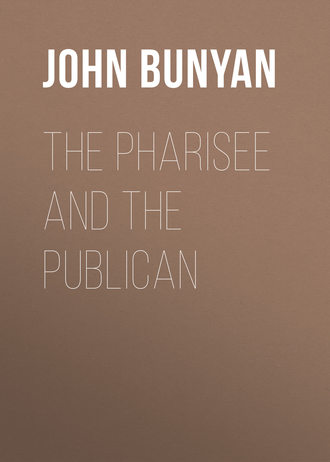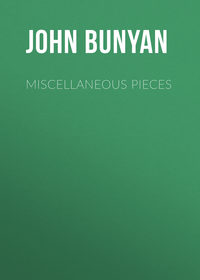 полная версия
полная версияThe Pharisee and the Publican
Nay, I say again, hath not thy thus doing charged God with being ignorant of knowing what rules there needed to be imposed on his creatures to make their obedience complete? And doth not this madness of thine intimate, moreover, that if thou hadst not stepped in with the bundle of thy traditions, righteousness had been imperfect, not through man’s weakness, but through impediment in God, or in his ministering rules of righteousness unto us?
Now, when thou hast thought on these things, fairly answer thyself these few questions. Is not this arrogancy? Is not this blasphemy? Is not this to condemn God, that thou mightst be righteous? And dost thou think, this is indeed the way to be righteous?
But again, what means thy preferring of thine own rules, laws, statutes, ordinances, and appointments, before the rules, laws, statutes, and appointments of God? Thinkest thou this to be right? Whither will thy zeal, thy pride, and thy folly carry thee? Is there more reason, more equity, more holiness in thy tradition, than in the holy, and just, and good commandments of God? Rom. vii. 12. Why then, I say, dost thou reject the commandment of God, to keep thine own tradition? Yea, why dost thou rage, and rail, and cry out, when men keep not thy law, or the rule of thine order, and tradition of thine elders, and yet shut thine eyes, or wink with them, when thou thyself shalt live in the breach of the law of God? Yea, why wilt thou condemn men, when they keep not thy law, but study for an excuse, yea, plead for them that live in the breach of God’s? Mark vii. 10–13. Will this go for righteousness in the day of God Almighty? Nay, rather, will not this, like a mill-stone about thy neck, drown thee in the deeps of hell? O the blindness, the madness, the pride, that dwells in the hearts of these pretended righteous men
Again, What kind of righteousness of thine is this that standeth in a mis-esteeming of God’s commands? Some thou settest too high, and some too low; as in the text, thou hast set a ceremony above faith, above love, and above hope in the mercy of God; when as it is evident, the things last mentioned, are the things of the first rate, the weightier matters; Matt. xxiii. 17.
Again, Thou hast preferred the gold above the temple that sanctifieth the gold; and the gift above the altar that sanctifieth the gift; Matt. xxiii. 17.
I say again, What kind of righteousness shall this be called? What back will such a suit of apparel fit, that is set together to what it should be? Nor can other righteousness proceed, where a wrong judgment precedeth it.
This misplacing of God’s laws cannot, I say, but produce misplaced obedience. It indeed produceth a monster, an ill-shaped thing, unclean, and an abomination to the Lord. For “see,” saith he (if thou wilt be making), “that thou make all things according to the pattern shewn thee in the mount.” Set faith, where faith should stand; a moral, where a moral should stand; and a ceremony, where a ceremony should stand: for this turning of things upside down shall be esteemed as the potter’s clay. And wilt thou call this thy righteousness? yea, wilt thou stand in this? wilt thou plead for this? and venture an eternal concern in such a piece of linsey-woolsey as this? O fools, and blind!
But, further, let us come a little closer to the point. O blind Pharisee, thou standest to thy righteousness: what dost thou mean? Wouldst thou have mercy for thy righteousness, or justice for thy righteousness.
If mercy, what mercy? Temporal things God giveth to the unthankful and unholy: nor doth he use to sell the world to man for righteousness. The earth hath he given to the children of men. But this is not the thing: thou wouldst have eternal mercy for thy righteousness; thou wouldst have God think upon what an holy, what a good, what a righteous man thou art and hast been. But Christ died not for the good and righteous, nor did he come to call such to the banquet that grace hath prepared for the world. “I came not,—I am not come (saith Christ) to call the righteous, but sinners to repentance;” Mark ii.; Rom. v. Yet this is thy plea; Lord, God, I am a righteous man; therefore grant me mercy, and a share in thy heavenly kingdom. What else dost thou mean when thou sayst, “God I thank thee, that I am not as other men are?” Why dost thou rejoice, why art thou glad that thou art more righteous (if indeed thou art) than thy neighbour, if it is not because thou thinkest that thou hast got the start of thy neighbour, with reference to mercy; and that by thy righteousness thou hast insinuated thyself into God’s affections, and procured an interest in his eternal favour? But,
What, what hast thou done by thy righteousness? I say, What hast thou given to God thereby? And what hath he received of thy hand? Perhaps thou wilt say, righteousness pleaseth God: but I answer no, not thine, with respect to justification from the curse of the law, unless it be as perfect as the justice it is yielded to, and as the law that doth command it. But thine is not such a righteousness: no, thine is speckled, thine is spotted, thine makes thee to look like a speckled bird in his eye-sight.
Thy righteousness has added iniquity, because it has kept thee from a belief of thy need of repentance, and because it has emboldened thee to thrust thyself audaciously into the presence of God, and made thee even before his holy eyes, which are so pure, that they cannot look on iniquity (Hab. i. 13), to vaunt, boast, and brag of thyself; and of thy tottering, ragged, stinking uncleanness; for all our righteousnesses are as menstruous rags, because they flow from a thing, a heart, a man, that is unclean. But,
Again, Wouldst thou have mercy for thy righteousness? For whom wouldst thou have it: for another, or for thyself? If for another (and it is most proper that a righteous man should intercede for another by his righteousness, rather than for himself), then thou thrustest Christ out of his place and office, and makest thyself to be a saviour in his stead; for a mediator there is already, even a mediator between God and man, and he is the man Christ Jesus.
But dost thou plead by thy righteousness for mercy for thyself? Why, in doing so, thou impliest—
1. That thy righteousness can prevail with God more than can thy sins; I say, that thy righteousness can prevail with God to preserve thee from death more than thy sins can prevail with him to condemn thee to it. And if so, what follows, but that thy righteousness is more, and has been done in a fuller spirit than ever were thy sins? But thus to insinuate, is to insinuate a lie; for there is no man but, while he is a sinner, sinneth with a more full spirit than a good man can act righteousness withal.
A sinner, when he sinneth, he doth it with all his heart, and with all his mind, and with all his soul, and with all his strength; nor hath he in his ordinary course any thing that bindeth. But with a good man it is not so; all and every whit of himself, neither is, nor can be, in every good duty that he doth. For when he would do good, evil is the Spirit, and the Spirit against the flesh, and these are present with him. And again, “The flesh lusteth against one to the other, so that ye cannot do the things would;” Gal. v. 17.
Now, if a good man cannot do good things with that oneness and universalness of mind, as a wicked man doth sin with, then is his sin heavier to weigh him down to hell than is his righteousness to buoy him up to the heavens.
And again, I say, if the righteousness of a good man comes short of his sin, both in number, weight, and measure, as it doth (for a good man shrinks and quakes at the thoughts of God’s entering into judgment with him, Psalm cxliii. 2); then is his iniquity more than his righteousness. And I say again, if the sin of one that is truly gracious, and so of one that hath the best of principles, is heavier and mightier to destroy him than is his righteousness to save him, how can it be that the Pharisee, that is not gracious, but a mere carnal man (somewhat reformed and painted over with a few lean and low formalities), should with his empty, partial, hypocritical righteousness counterpoise his great, mighty, and weighty sins, that have cleaved to him in every state and condition of his, to make him odious in the sight of God?
2. Dost thou plead by thy righteousness for mercy for thyself? Why in so doing thou impliest, that mercy thou deservest; and that is next door to, or almost as much as to say, God oweth me what I ask for. The best that can be put upon it is, thou seekest security from the direful curse of God, as it were by the works of the law, Rom. ix. 31–33; and to be sure, betwixt Christ and the law, thou wilt drop into hell. For he that seeks for mercy, as it were, and but as it were, by the works of the law, doth not altogether trust thereto. Nor doth he that seeks for that righteousness that should save him as it were by the works of the law, seek it only wholly and solely at the hands of mercy.
So then, to seek for that that should save thee, neither at the hands of the law, nor at the hands of mercy, is to be sure to seek it where it is not to be found; for there is no medium betwixt the righteousness of the law and the mercy of God. Thou must have it either at the door of the law, or at the door of grace. But sayst thou, I am for having of it at the hands of both. I will trust solely to neither. I love to have two strings to my bow. If one of them, as you think, can help me by itself, my reason tells me that both can help me better. Therefore will I be righteous and good, and will seek by my goodness to be commended to the mercy of God: for surely he that hath something of his own to ingratiate himself into the favour of his prince withal, shall sooner obtain his mercy and favour, than one that comes to him stripped of all good.
I answer, But there are not two ways to heaven: there is but one new and living way which Christ hath consecrated for us through the vail, that is to say, his flesh; and besides that one, there is no more; Heb. x. 19–24. Why then dost thou talk of two strings to thy bow? What became of him that had, and would have two stools to sit on? yea, the text says plainly, that therefore they obtained not righteousness, because they sought it not by faith, but as it were by the works of the law. See here, they are disowned by the gospel, because they sought it not by faith, that is, by faith only. Again, the law, and the righteousness thereof, flies from them (nor could they attain it, though they follow after it), because they sought it not by faith.
Mercy then is to be found alone in Jesus Christ. Again, the righteousness of the law is to be obtained only by faith of Jesus Christ; that is, in the Son of God is the righteousness of the law to be found; for he, by his obedience to his Father, is become the end of the law for righteousness. And for the sake of his legal righteousness (which is also called the righteousness of God, because it was God in the flesh of the Lord Jesus that did accomplish it), is mercy, and grace from God extended to whoever dependeth by faith upon God by this Jesus his righteousness for it. And hence it is, that we so often read, that this Jesus is the way to the Father; that God, for Christ’s sake, forgiveth us; that by the obedience of one many are made righteous, or justified; and that through this man is preached to us the forgiveness of sins; and that by him all that believe are justified from all things from which they could not be justified by the law of Moses.
Now, though I here do make mention of righteousness and mercy, yet I hold there is but one way, to wit, to eternal life; which way, as I said, is Jesus Christ; for he is the new, the only new and living way to the Father of mercies, for mercy to make me capable of abiding with him in the heavens for ever and ever.
But sayst thou, I will be righteous in myself that I may have wherewith to commend me to God, when I go to him for mercy?
I answer, But thou blind Pharisee, I tell thee thou hast no understanding of God’s design by the gospel, which is, not to advance man’s righteousness, as thou dreamest, but to advance the righteousness of his Son, and his grace by him. Indeed, if God’s design by the gospel was to exalt and advance man’s righteousness, then that which thou hast said would be to the purpose; for what greater dignity can be put upon man’s righteousness, than to admit it?
I say then, for God to admit it, to be an advocate, an intercessor, a mediator; for all these are they which prevail with God to shew me mercy. But this God never thought of, much less could he thus design by the gospel; for the text runs flat against it. Not of works, not of works of righteousness, which we have done; “Not of works, lest any man should boast,” saying, Well, I may thank my own good life for mercy. It was partly for the sake of my own good deeds that I obtained mercy to be in heaven and glory. Shall this be the burden of the song of heaven? or is this that which is composed by that glittering heavenly host, and which we have read of in the holy book of God? No, no; that song runs upon other feet—standeth in far better strains, being composed of far higher and truly heavenly matter: for God has “predestinated us unto the adoption of children by Jesus Christ to himself, according to the good pleasure of his will, to the praise of the glory of his grace, wherein he hath made us accepted in the Beloved: in whom we have redemption through his blood, the forgiveness of sins, according to the riches of his grace;” Eph. i. And it is requisite that the song be framed accordingly; wherefore he saith, that the heavenly song runs thus—“Thou art worthy to take the book, and to open the seals thereof; for thou wast slain, and hast redeemed us to God by thy blood, out of every kindred, and tongue, and people, and nation; and hast made us unto our God kings and priests; and we shall reign on the earth;” Rev. v. 9, 10.
He saith not that they have redeemed, or helped to redeem and deliver themselves; but that the Lamb, the Lamb that was slain; the Lamb only was he that redeemed them. Nor, saith he, that they had made themselves kings and priests unto God to offer any oblation, sacrifice, or offering whatsoever, but that the same Lamb had made them such: for they, as is insinuated by the text, were in, among, one with, and no better than the kindreds, tongues, nations, and people of the earth. Better! “No, in no wise,” saith Paul (Rom. iii. 9); therefore their separation from them was of mere mercy, free grace, good will, and distinguishing love; not for, or because of works of righteousness which any of them have done; no, they were all alike. But these, because beloved when in their blood (according to Ezek. xvi.), were separated by free grace; and as another scripture hath it, “redeemed from the earth,” and from among men by blood; Rev. xiv. 3, 4. Wherefore deliverance from the ireful wrath of God must not, neither in whole nor in part, be ascribed to the whole law, or to all the righteousness that comes by it, but to this Lamb of God, Jesus, the Saviour of the world; for it is he that delivered us from the wrath to come, and that according to God’s appointment; “for God hath not appointed us to wrath, but to obtain salvation by (or through) our Lord Jesus Christ;” 1 Thess. i. 10; v. 9. Let every man, therefore, take heed what he doth, and whereon he layeth the stress of his salvation; “For other foundation can no man lay than that is laid, which is Jesus Christ;” 1 Cor. iii. ii.
But dost thou plead still as thou didst before, and wilt thou stand thereto? Why then, thy design must overcome God, or God’s design must overcome thee. Thy design is to give thy good life, thy good deeds, a part of the glory of thy justification from the curse. And God’s design is to throw all thy righteousness out into the street, into the dirt and dunghill, as to that thou art for glory, and for glorying here before God; yea, thou art sharing in the glory of justification when that alone belongeth to God. And he hath said, “My glory will I not give to another.” Thou wilt not trust wholly to God’s grace in Christ for justification; and God will not take thy stinking righteousness in as a partner in thy acquitment from sin, death, wrath, and hell. Now the question is, Who shall prevail? God, or the Pharisee? and whose word shall stand? his, the Pharisee’s?
Alas! the Pharisee here must needs come down, for God is greater than all. Also, he hath said, that no flesh shall glory in his presence; and that he will have mercy, and not sacrifice. And again, that it is not (or shall be) in him that wills, nor in him that runs, but in God that sheweth mercy. What hope, help, stay, or relief, then is there left for the merit-monger? What twig, or straw, or twined thread, is left to be a stay for his soul? This besom will sweep away his cobweb: the house that this spider doth so lean upon, will now be overturned, and he in it, to hellfire; for nothing less than everlasting damnation is designed by God, and that for this fearful and unbelieving Pharisee: God will prevail against him for ever.
3. But wilt thou yet plead thy righteousness for mercy? Why, in so doing thou takest away from God the power of giving mercy. For if it be thine as wages, it is no longer his to dispose of at pleasure; for that which another man oweth me, is in equity not at his, but at my disposal. Did I say that by this thy plea thou takest away from God the power of giving mercy? I will add, yea, and also of disposing of heaven and life eternal. And then, I pray you, what is left unto God, and what can he call his own? Not mercy, for that by thy good deeds thou hast purchased: not heaven, for that by thy good deeds thou hast purchased: not eternal life, for that by thy good deeds thou hast purchased. Thus, Pharisee (O thou self-righteous man), hast thou set up thyself above grace, mercy, heaven, glory; yea, above even God himself, for the purchaser should in reason be esteemed above the purchase.
Awake, man! What hast thou done? Thou hast blasphemed God; thou has undervalued the glory of his grace; thou hast, what in thee lieth, opposed the glorious design of heaven; thou hast sought to make thy filthy rags to share in thy justification.
Now, all these are mighty sins; these have made thine iniquity infinite. What wilt thou do? Thou hast created to thyself a world of needless miseries. I call them needless, because thou hadst more than enough before. Thou hast set thyself against God in a way of contending, thou standest upon thy points and pantables; thou wilt not bate God an ace of what thy righteousness is worth, and wilt also make it worth what thyself shalt list: thou wilt be thine own judge, as to the worth of thy righteousness; thou wilt neither hear what verdict the word has passed about it, nor wilt thou endure that God should throw it out in the matter of thy justification, but quarrelest with the doctrine of free grace, or else dost wrest it out of its place to serve thy Pharisaical designs; saying, “God I thank thee, I am not as other men;” fathering upon thyself, yea, upon God and thyself a stark lie; for thou art as other men are, though not in this, yet in that; yea, in a far worse condition than the most of men are. Nor will it help thee anything to attribute this thy goodness to the God of heaven; for that is but a mere toying; the truth is, the God that thou intendest is nothing but thy righteousness; and the grace that thou supposest is nothing but thine own good and honest intentions. So that,
4. In all that thou sayst thou dost but play the downright hypocrite: thou pretendest indeed to mercy, but thou intendest nothing but merit: thou seemest to give the glory to God, but at the same time takest it all to thyself: thou despisest others, and criest up thyself; and in conclusion, fatherest all upon God by word, and upon thyself in truth. Nor is there anything more common among this sort of men, than to make God, his grace, and kindness, the stalking-horse to their own praise, saying, “God, I thank thee,” when they trust to themselves that they are righteous, and have not need of any repentance; when the truth is, they are the worst sort of men in the world, because they put themselves into such a state as God hath not put them into, and then impute it to God, saying, God, I thank thee, that thou hast done it; for what greater sin than to make God a liar, or than to father that upon God which he never meant, intended, or did: and all this under colour to glorify God, when there is nothing else designed, but to take all glory from him, and to wear it on thine own head as a crown, and a diadem, in the face of the whole world.
A self-righteous man, therefore, can come to God for mercy no otherwise than fawningly: for what need of mercy hath a righteous man? Let him then talk of mercy, of grace, and goodness, and come in an hundred times with his, “God, I thank thee,” in his mouth, all is but words; there is no sense, nor savour, nor relish, of mercy and favour; nor doth he in truth, from his very heart, understand the nature of mercy, nor what is an object thereof; but when he thanks God, he praises himself: when he pleads for mercy, he means his own merit; and all this is manifest from what doth follow; for, saith he, I am not as this Publican: thence clearly insinuating, that not the good, but the bad, should be rejected of the God of heaven: that not the bad but the good, not the sinner, but the self-righteous, are the most proper objects of God’s favour. The same thing is done by others in this our day: favour, mercy, grace, and, “God, I thank thee,” is in their mouths, but their own strength, sufficiency, free-will, and the like, they are the things they mean by all such high and glorious expressions.
But, secondly, If thy plea be not for mercy, but for justice, then to speak a little to that. 1. Justice has measures and rules to go by; unto which measures and rules, if thou comest not up, justice can do thee no good. Come then, O thou blind Pharisee, let us pass away a few minutes in some discourse about this. Thou demandest justice, because God hath said, that the man that doth these things shall live in and by them. And again, the doers of the law shall be justified, not in a way of mercy, but in a way of justice: “He shall live by them.” But what hast thou done, O blind Pharisee? What hast thou done, that thou art emboldened to venture to stand and fall to the most perfect justice of God? Hast thou fulfilled the whole law, and not offended in one point? Hast thou purged thyself from the pollutions and motions of sin that dwell in thy flesh, and work in thy own members? Is the very being of sin rooted out of thy tabernacle? And art thou now as perfectly innocent as ever was Jesus Christ? hast thou, by suffering the uttermost punishment that justice could justly lay upon thee for thy sins, made fair and full satisfaction to God, according to the tenor of his law, for thy transgressions? If thou hast done all these things, then thou mayst plead something, and yet but something, for thyself, in a way of justice. Nay, in this I will assert nothing, but will rather inquire: What hast thou gained by all this thy righteousness? (We will now suppose what must not be granted:) Was not this thy state when thou wast in thy first parents? Wast thou not innocent, perfectly innocent and righteous? And if thou shouldst be so now, what hast thou gained thereby? Suppose that the man that had, forty years ago, forty pounds of his own, and had spent it all since, should yet be able now to shew his forty pounds again; what has he got thereby, or how much richer is he at last than he was when he first set up for himself? Nay, doth not the blot of his ill living betwixt his first and his last, lie as a blemish upon him, unless he should redeem himself also, by works of supererogation, from the scandal that justice may lay at his door for that.
But, I say, suppose, O Pharisee, this should be thy case, yet God is not bound to give thee in justice that eternal which by his grace he bestoweth upon those that have redemption from sin, by the blood of his Son. Injustice, therefore, when all comes to all, thou canst require no more than an endless life in an earthly paradise; for there thou wast set up at first; nor doth it appear from what hath been said, touching all that thou hast done or canst do, that thou deservest a better place.
Did I say, that thou mayst require justly an endless life in an earthly paradise? Why, I must add to that saying this proviso, If thou continuest in the law, and in the righteousness thereof; else not.









